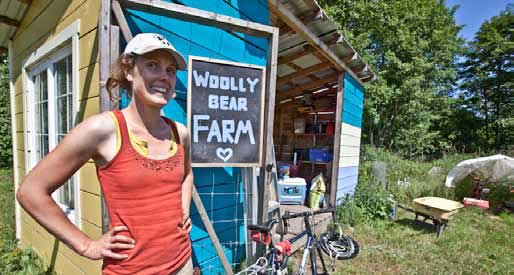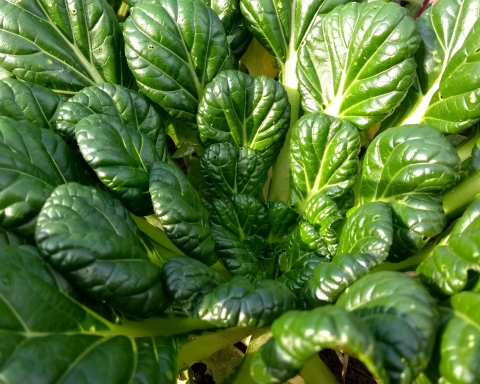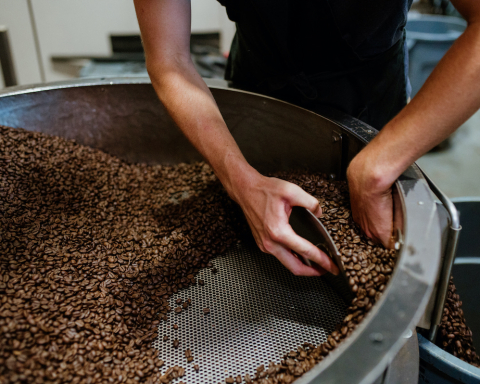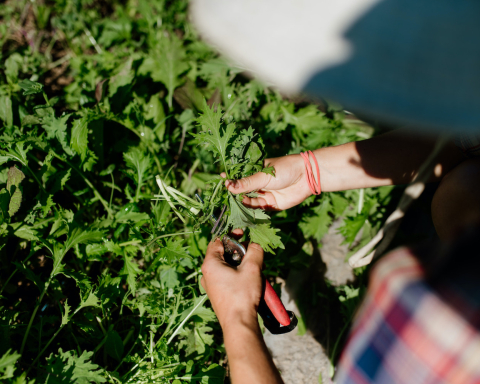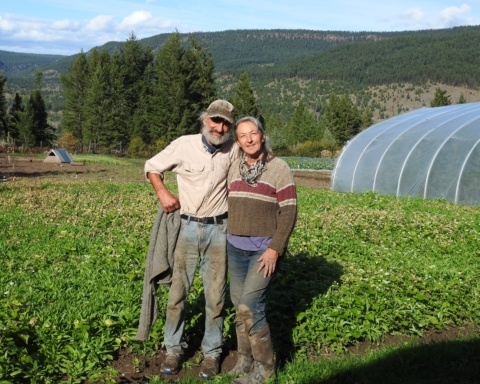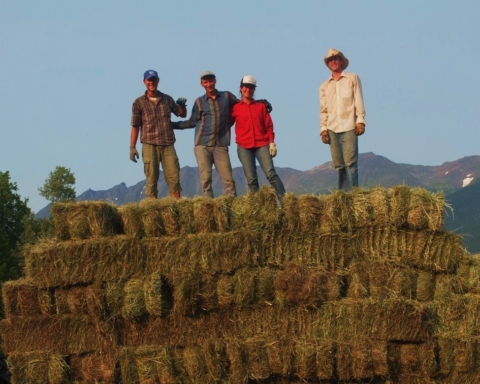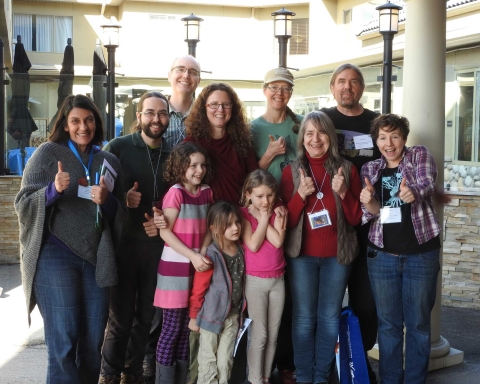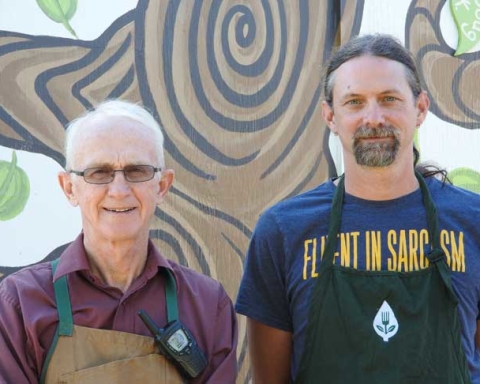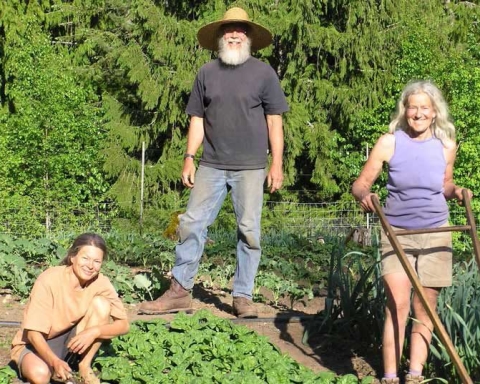Hannah Roessler
A New Farmer Struggles to Go From Caterpillar to Butterfly
I have been pretty amazed by every farmer I’ve ever met — their competence, determination and impressive suite of skills.
But now that I am a new farmer myself, I find myself in awe of Liz Perkins of Woolly Bear Farm, a one-acre market garden in Cordova Bay, near Victoria. While I have dabbled seriously in farming for years, exploring various permutations, styles, and types, I only really jumped in with both boots once I had an established, relatively low-risk scenario within which I could safely start farming “on my own.”
Liz, on the other hand, found a raw piece of land and just went for it — and her efforts and risk-taking have really paid off.
Challenges Aplenty
We all know how difficult it can be as a new farmer just starting out. It’s always the same things that get in the way — infrastructure costs are overwhelming, mistakes are plentiful, and land is hard to come by.
Most people don’t get into farming because they love business and marketing; they do it because they love to grow things. Starting up your farm is fun and exciting, but like any new small business it can also be a financial quagmire, layered with intense knowledge requirements and drastically shifting parameters. Not for the faint of heart.
But uncertainty is something that you just have to be comfortable with in order to be a good farmer. And Liz is a darn good farmer. She spent a year in Vancouver working with food through a social justice lens, an entry point to farming that is common among many of the younger farming generation.
She then spent a couple of years working on urban agriculture initiatives, but soon realized that she was not as passionate about educating people about farming as she had originally thought. What she really wanted was to just do it herself — to farm and produce an abundance of food.
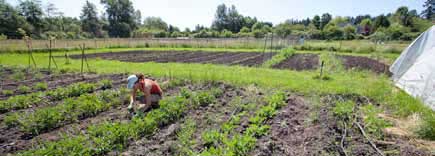
A Farmer’s Education
She applied to the UBC Farm Program and to the Linnaea Ecological Gardening Program, ultimately settling on Linnaea, a farm school located on Cortes Island, BC, where she attended their holistic, full-immersion permaculture program.
“Being at Linnaea changed my life. It was incredible,” says Liz with a smile. The in-depth training offered through Linnaea along with the community-building aspect left a deep impression on her, and she knew she was on the road to farming forever.
While Linnaea Farm School set the course, an apprenticeship with Rachel Fisher and Saanich Organics helped Liz put the structure in place for a successful business.
Says Liz, “I learned an incredible amount during my time with Saanich Organics. Rachel taught me how to grow an abundance of vegetables, and I learned so much about the business aspect of farming.”
After her apprenticeship, she optimistically stuck an ad in a couple of local papers asking to rent an acre of land for farming in exchange for $500 per year, a box of veggies a week, and of course, farm tax status. She had several replies from interested land-owners and says that overall, it was not too difficult to find someone willing to rent to a start-up farmer.
Fast Track to Certification
Despite the perception that organic certification can be difficult for leasing farmers, according to Liz, it’s not as hard as new growers may think. “There had been nothing growing in that field for the six years that my landlord had lived there prior to 2011, so he signed an affidavit guaranteeing that no prohibited substances were applied to the land in the last three years. This meant I could fast-track to organic certification after one year on the land,” says Liz.
She adds, “The fact that I might get kicked off the land at any point is a bummer of a risk, but I don’t think I would have been able to farm without being able to sell at Moss Street Market and Saanich Organics. Both institutions have been a big marketing and moral support network for me. So far, no regrets!”
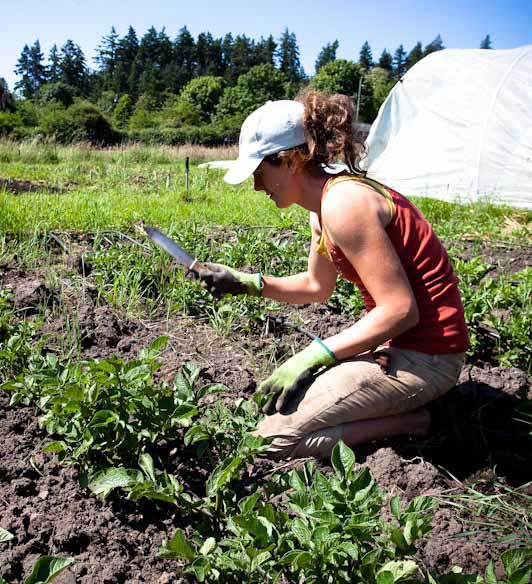
However, acquiring the land and the certification were only the first steps, and Liz went on to encounter more challenges. Her original business plan underestimated her initial set-up costs, and she is ever-grateful to her parents for helping out financially until the business gets on its feet. The first year, her farm’s humble sales of $10,000 were not enough to cover expenses, and in year two she just broke even – doubling sales to $20,000. She is now in her third year of farming and can smell financial freedom with a prediction of $30,000 in sales and of course much-reduced expenses.
Hard Won Advice
Says Liz, “Some of the things I had to do to start out, I just didn’t consider. I had to spend so much time preparing and setting up the farm, I had no income to live on.
“I feel like I wasted a lot of money on failed experiments. I got the wrong tiller, tried to use solely pond water for my irrigation (which didn’t work), bought huge coolers to act as my cold room, I had to learn how to build because everything I built kept getting blown down….
There’s a lot to consider when starting out, and I think that if I knew what I know now, I’d start out differently, and save a lot of money!”
The best part of this conversation is that Liz is laughing. She is taking it all in stride. Even while she’s on leased land, she’s just planted a section of blueberries on her rented acre. When I comment on her impressive ability to take chances, her bravery, she jokes that maybe she’s really just a bit crazy. But there is no denying that her farm looks really good. Liz Perkins is the picture of success for a new farmer, and she’s doing a great job at Woolly Bear Farms. I think she’s got the right recipe to make it work. Maybe we all need a dash of “a little bit of crazy” to be successful farmers.
Learn more about Liz’s path to farming independence:
Hannah Roessler has farmed in Nicaragua, Washington, and BC on permaculture farms, polyculture cafetals, organic market farms and a biodynamic vineyard. She has an MA in Environmental Studies, and her research is focused on climate change and small-scale organic farming. She currently farms on the Saanich Peninsula on Vancouver Island.


